Biology Made Real: Ways of Teaching that Inspire Meaning-Making
£15.20
—Dr Michael J. Reiss, Professor of Science Education, University of London
‘This is a book that all teachers, not just biology teachers should read.’
—Ben Strathearn-Burrows, Head of Biology, Emanuel School
Introduction
I’ve been motivated to discover what biology is to us as humans. What it means to understand biology, and how I could make it meaningful for my students. I’ve read as much as I could and reflected, I’ve discussed and listened, I’ve taught and observed. This book is about sharing what I’ve learnt with my secondary-school mixed-attainment biology classes.
‘Not only is this book likely to change how you teach biology but also how you perceive yourself within the living world.’
—Dr Alex Sinclair, Institute of Education, St Mary’s University, Twickenham
What you’ll find inside:
- A vision for an integrated and meaningful biology education.
- A framework for teaching for meaning-making, which cuts planning time.
- Ways of creating a unified narrative across disparate topics.
- A taxonomy of understanding that unlocks problem-solving with minimal workload.
- Tried and tested examples from mixed-attainment biology classrooms.
Chapter 1: Meaningful biology relates principally to organisms:
This sets the scene for the whole book. It brings together many threads to define what I see as most meaningful to secondary biology students. And therefore what we could do about it when designing our lessons & curricula and thinking about how students progress through their biology education. Planning for meaning-making has vastly enhanced interest and motivation to learn in my classroom.
Chapters 2 & 3: Teaching for meaning using variation theory:
Next I introduce a powerful—relatively unknown and often misunderstood—pedagogical theory. Variation theory. In these chapters I set out to show how useful it is—and easy to use—in the secondary biology classroom, with many examples.
Chapter 4: How to integrate organisms, ecology & evolution:
Now I pull together the previous chapters to present a new framework for teaching for meaning-making that cuts planning time & focuses on biology.
‘An excellent text demanding we think not just about what we teach but also why and how.’
—Dr Paul Ganderton, Consultant and researcher
Chapter 5: Concepts of the organism that unite a biology course:
Here I discuss two concepts that I think can unify all the topics on the curriculum.
1. Seeing biology through thermodynamic systems lens and
2. Seeing biology through an ecological-evolutionary lens via the concept of life strategies. I lay out the reasons why and discuss how I’ve introduced these ideas with students.
Chapter 6: Teaching systems thinking to help students see interconnectedness:
I show how stock and flow diagrams are very useful for the biology classroom and give examples. Next, I introduce a new taxonomy of understanding biological systems that unlocks problem-solving in biology.
Chapter 7: Establishing a thinking classroom:
This chapter is focused on the whys and hows of embedding the taxonomy into biology curricula. I give examples of how I use it and examples of my students answers from lower and upper secondary courses.
Chapter 8: Navigating classroom and biological complexity:
This chapter rounds up the book by considering the complexity of our subject and the classroom.
‘Biology Made Real comes with an education health warning—be prepared to have your beliefs challenged.’
—Dr Alex Sinclair
Read more
Additional information
| Publisher | Christian Moore Anderson (23 April 2023) |
|---|---|
| Language | English |
| Paperback | 208 pages |
| ISBN-10 | 8409494272 |
| ISBN-13 | 978-8409494279 |
| Dimensions | 15.24 x 1.19 x 22.86 cm |

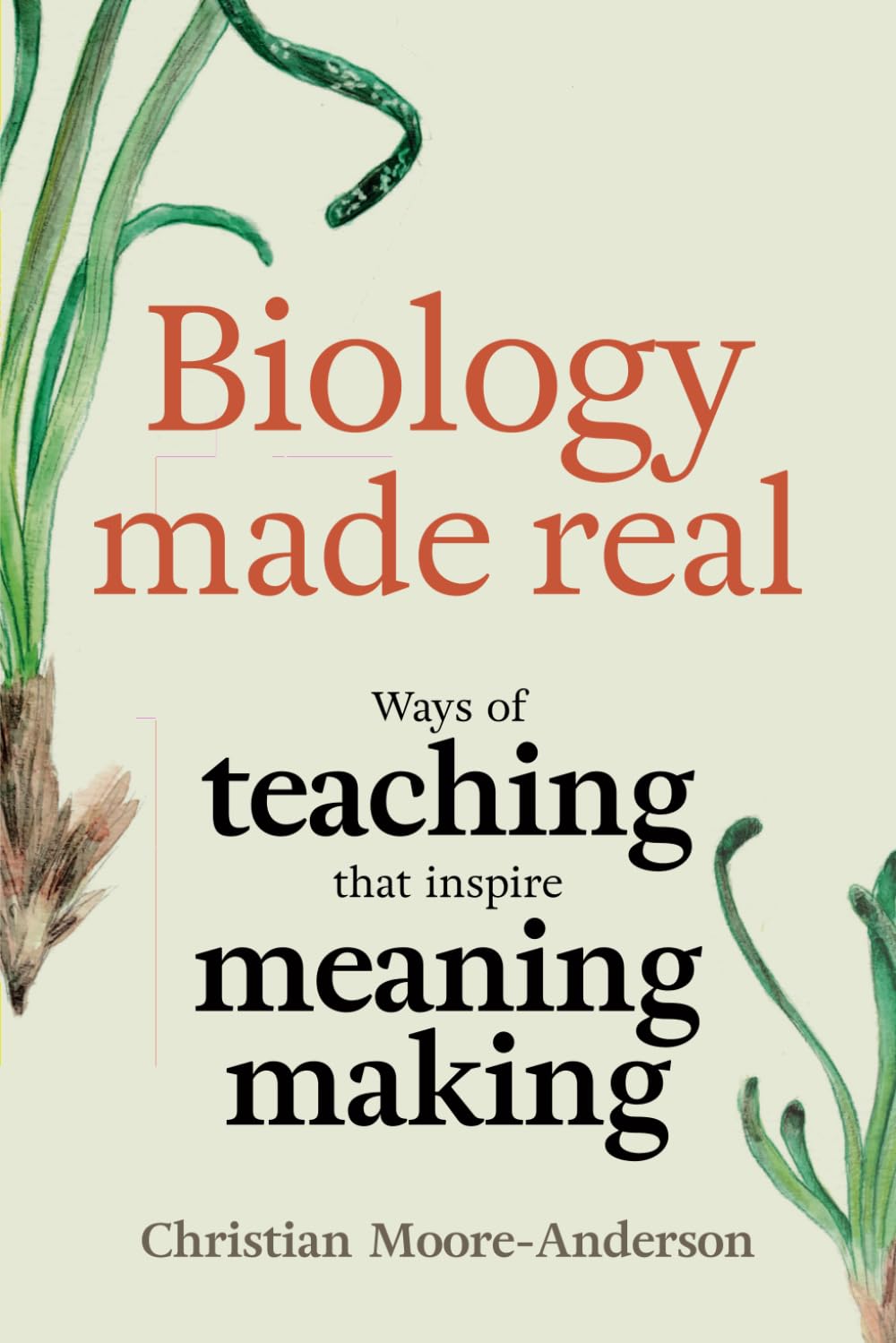
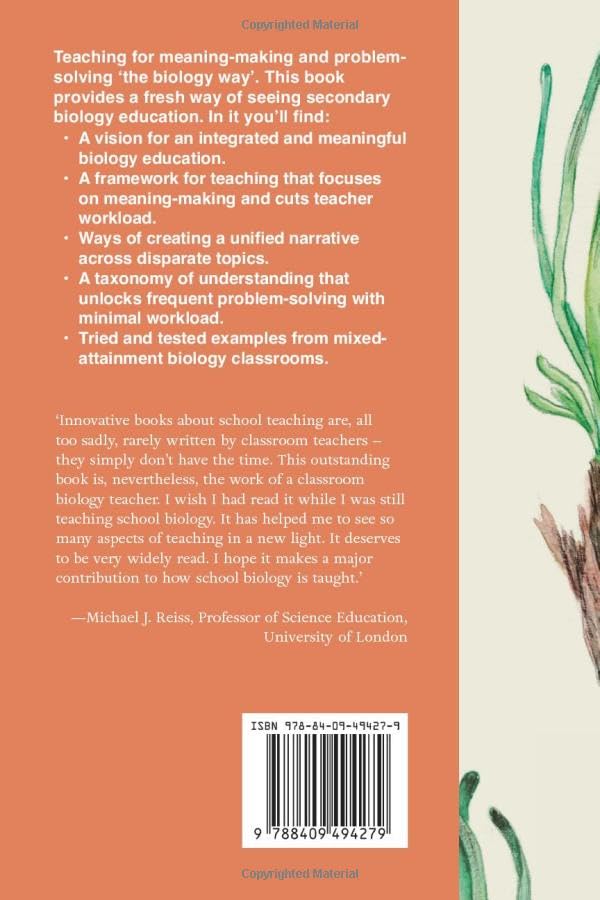
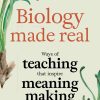

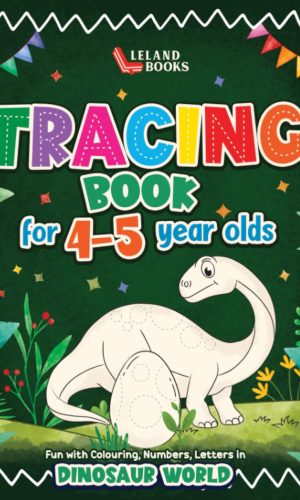
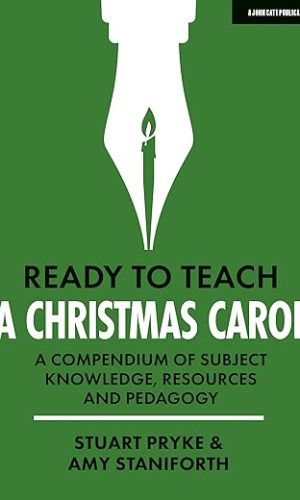

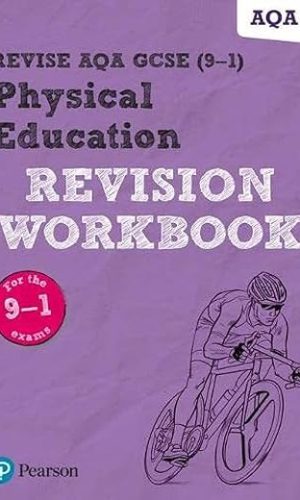
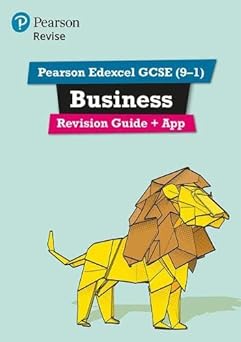


by B M ROGERS
I found this book opened up my thinking about learning in science lessons. I’ve used Cognitive Load Theory effectively in my teaching for years. I’ve been aware of variation theory, but this book has helped me turbo charge my thinking using it. A really important book with the potential for serious improvement in science teaching.
by Mr
I enjoyed reading Christian’s insights into the variation theory and how this informs the practice of a teacher. I also enjoyed many of Christian’s examples from his own personal practice, that model what variation theory looks like. Whilst lots of students are aware that Biology is a subject with lots of content to memorise, Christian moves away from this over simplification of any Biology course to model that teachers are attempting to represents relationships that exists in the natural world, such as systems thinking. I would strongly recommend this book any Biology teacher and any teacher in general!
by Mr Edwards
An excellent read, packed with useful and important thinking about teaching the subject. Thank you!
by Martyn
A great book, supported by incredibly deep and informed thinking. This thoughtful, conceptual book needs to be read by the people who write school curricula but also does an excellent job of making it accessible and relevant to teachers to. I’ll definitely encourage my biology colleagues to read it!
by Joe Eamer
In this book Christian explores how to enhance the understanding of pupils studying biology by showing how topics can be integrated to allow schema to developed at a much higher rate for learners. I recognised several strategies form my own practice that I have developed and learned over the years, but also discovered lots of other great insights and techniques for the classroom. Experience brings you to a certain point but if you are just beginning your teaching journey then this book is a great shortcut to delivering holistic, meaningful and memorable content so that learners are more able to understand the concepts in biology much more easily. It is a path to enjoyment of the subject through knowledge and application of content. A must read for all Biology teachers, early in their careers or those with more experience as well.
by DuseMato
This is a great book. I happily transitioned from a biology specialist to a physics specialist many years ago but this is the first book to have reignited my interest in teaching biology again.
The author explains new refreshing ways to think about concepts and content with the sole intention of making learning more meaningful. They expertly explain how prioritising meaning and interconnectedness can revitalise the teaching and learning in the classroom. They also have introduced me to two ways of thinking that have the potential to be very powerful and broad reaching. Variation theory and systems theory.
There is no doubt that all biology teachers would benefit from the specific examples given in this book but speaking as a physics teacher I can say it has got me thinking and rethinking in all kinds of ways.
by thandiwe banda
Christian writes eloquently and enables one to reflect on meaning making in their lessons. The book argues for better examples when teaching biology with clear links to evidence from literature.
A great read for any Teacher of Science and Curriculum Leads
by Kindle Customer
The author brings together the personal, pedagogical and philosophical in an engaging and informed way. It encourages me to think about by understanding of biology and its pedagogy in a different way. There are so many books about teaching, this one will definitely make its way onto my core reading list for my PGCE students.